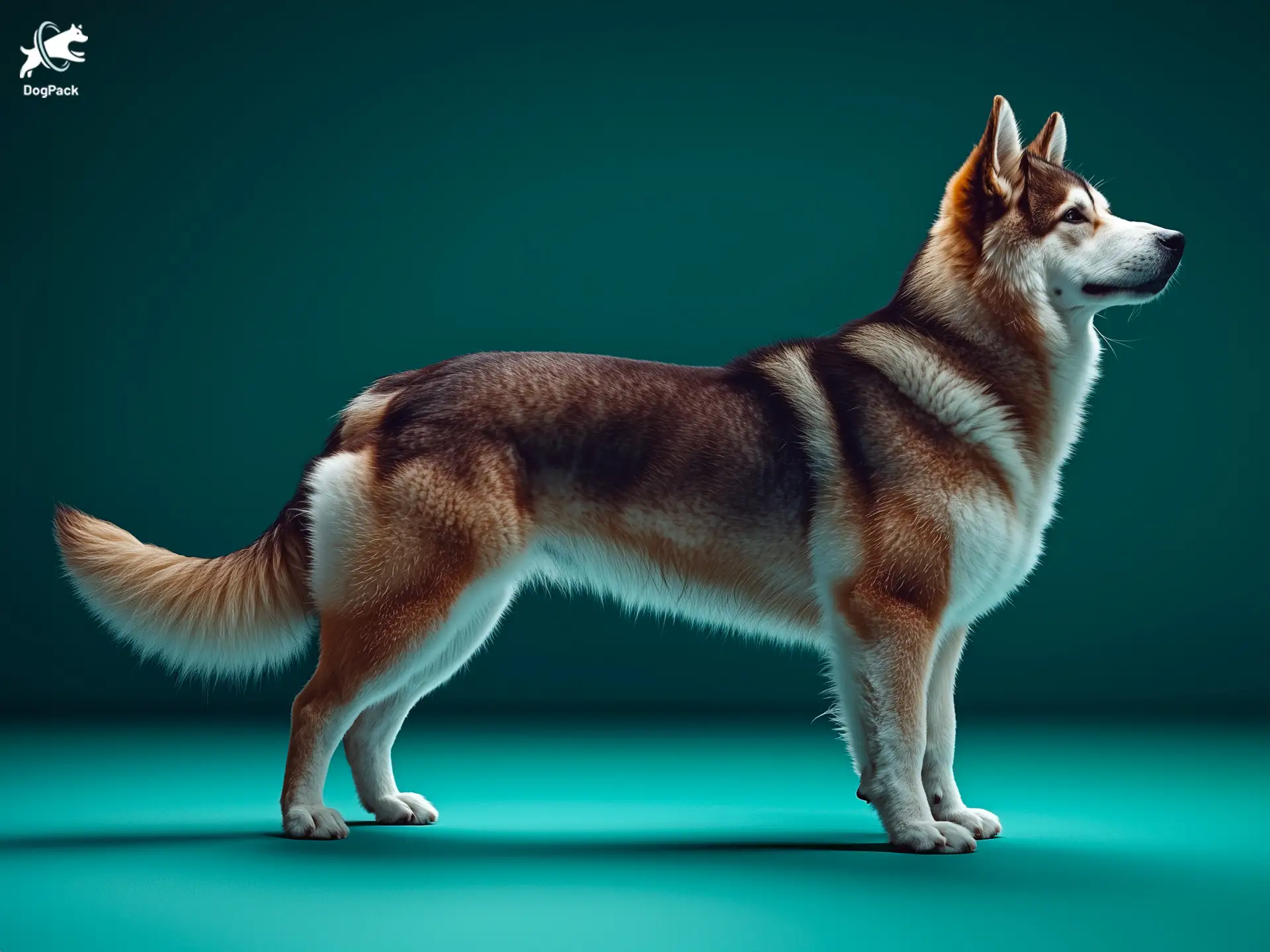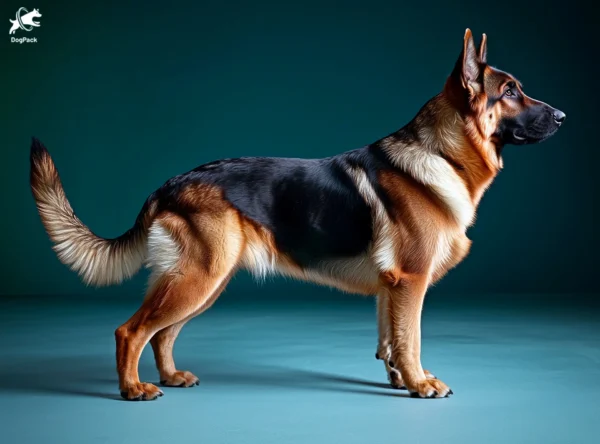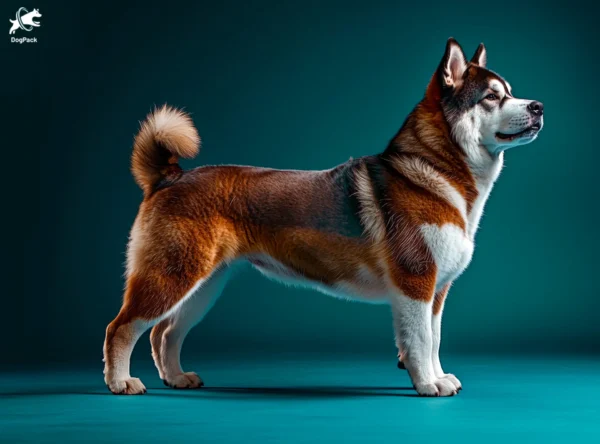Akita Shepherd Dog Breed Info & Overview
Ever wondered what happens when you mix the dignified Akita with the intelligent German Shepherd? Meet the Akita Shepherd! This impressive hybrid brings together the loyalty, strength, and protection of the Akita with the intelligence, work ethic, and devotion of the German Shepherd. With a strong bond to their family and a protective nature, the Akita Shepherd is a loving companion you’ll never forget.
Characteristics
Pictures
Breed History
The Akita Shepherd is a relatively new hybrid, blending the Akita’s noble heritage with the German Shepherd’s renowned intelligence. Originating in the United States, this breed was developed to combine the best traits of both parents. While not as ancient as its predecessors, the Akita Shepherd carries a rich lineage of working and protective dogs.
Mixing the Akita, known for its bravery in Japan, with the German Shepherd, famed for its versatility in Germany, was a stroke of genius. The goal was to create a dog that’s both a loyal family companion and a vigilant guardian. And let’s be honest, who wouldn’t want a two-in-one deal?
Despite its growing popularity, the Akita Shepherd remains a rare gem. Breeders are selective to ensure the integrity and health of the breed, so finding one might require a bit of patience—but it’s well worth the wait.
Temperament, Personality
Akita Shepherds are the epitome of loyalty. They form strong bonds with their families and are always on the lookout to protect them. Their intelligence makes them quick learners, but it also means they can be a bit headstrong. Early socialization is key to ensure they get along with other pets and strangers.
These dogs have a protective streak a mile wide. While that’s great for security, it means they might be wary of unfamiliar faces. Don’t worry, though—proper training can help channel this trait positively. Plus, their alertness makes them excellent watchdogs.
With children, especially older ones, Akita Shepherds can be playful and affectionate. Just remember, their size and energy levels might be a bit much for the tiniest tots. Supervision is always a good idea to keep playtime safe and fun.
Physical Characteristics
The Akita Shepherd is a striking dog, boasting a muscular build and a commanding presence. They typically stand between 24–28 inches tall (61–71 cm) and weigh anywhere from 75–120 pounds (34–54 kg). Talk about a gentle giant!
Their coat is usually double-layered, combining the Akita’s plushness with the German Shepherd’s versatility. Coat colors can range from black, brown, tan, to even white. Their eyes are often almond-shaped, exuding intelligence and a hint of mischief.
Distinctive features include a strong jawline, erect ears, and a bushy tail that might curl slightly—thanks to their Akita genes. All in all, the Akita Shepherd is a head-turner, guaranteed to draw admiring glances during your walks.
Health Issues
Like all breeds, the Akita Shepherd has its share of health considerations. Hip dysplasia is common, given their large size and genetic background. Regular vet check-ups and maintaining a healthy weight can mitigate this risk.
They may also be prone to bloat, a serious condition affecting deep-chested dogs. Feeding smaller, frequent meals and avoiding strenuous exercise after eating can help prevent this. Eye conditions like progressive retinal atrophy might also occur, so routine eye exams are advisable.
Overall, the Akita Shepherd is a robust breed, but proactive healthcare is essential. Investing in pet insurance or setting aside funds for medical expenses is a wise move for any potential owner.
Grooming Needs
Grooming an Akita Shepherd is moderately demanding. Their double coat sheds seasonally, so expect heavier shedding during those times. Regular brushing, about two to three times a week, will help manage loose hair and keep their coat looking its best.
Bathing should be done as needed—overbathing can strip natural oils from their skin. Don’t forget routine care like nail trimming, ear cleaning, and dental hygiene. Starting these practices early will make them more tolerable for your furry friend.
Despite the extra effort, grooming time can be a bonding experience. And hey, a little fur on your clothes is a small price to pay for the love of an Akita Shepherd, right?
Exercise Requirements
Akita Shepherds are high-energy dogs that thrive on activity. Aim for at least 1–2 hours of exercise daily. This can include walks, runs, or play sessions in a securely fenced yard. Mental stimulation is just as important, so consider puzzle toys or obedience training.
These dogs excel in activities like agility and tracking. Engaging them in such sports can keep them physically fit and mentally sharp. Plus, it’s a fantastic way to strengthen your bond.
Skipping on exercise isn’t an option. Without it, the Akita Shepherd might become bored and resort to undesirable behaviors. So, lace up those sneakers and enjoy the great outdoors together!
Training Tips
Training an Akita Shepherd requires patience and consistency. Their intelligence means they pick up commands quickly, but their independent streak might test your resolve. Positive reinforcement methods work best—think treats, praise, and plenty of affection.
Socialization from a young age is crucial. Expose them to different environments, people, and animals to foster a well-rounded temperament. Enrolling in puppy classes can provide structured learning and social opportunities.
Remember, harsh training methods can backfire with this breed. Stay firm but gentle, and consider seeking professional help if you encounter challenges. With the right approach, your Akita Shepherd can become a well-mannered companion.
Nutrition, Diet
Feeding an Akita Shepherd requires attention to quality and quantity. Given their size and energy levels, they typically need 3 to 4 cups of high-quality dry dog food daily, split into two meals. Opt for food rich in protein to support muscle development.
Monitor their weight to prevent obesity, which can exacerbate joint issues. Consult your vet to tailor a diet plan that suits your dog’s age, activity level, and health status. Fresh water should always be available.
Avoid overfeeding and steer clear of table scraps, especially those harmful to dogs. A balanced diet will keep your Akita Shepherd in peak condition, ready for all the adventures ahead.
Adoption, Breeders
If you’re considering adding an Akita Shepherd to your family, start by checking local shelters and rescue organizations. Mixed breeds like this often end up in need of a loving home. Websites like Akita Club of America can help you locate adoptable dogs in your area.
For those leaning towards a breeder, ensure they are reputable and prioritize the health of their dogs. Ask for health clearances and visit the facility if possible. The Akita Club of America and the German Shepherd Dog Club of America can provide breeder referrals and additional resources.
Remember, adopting or purchasing a dog is a long-term commitment. Do your homework to find a companion that’s the perfect fit for your home and lifestyle.
Family Pet?
Akita Shepherds can make excellent family pets, especially for families with older children. Their protective nature means they’ll watch over your loved ones diligently. However, their size and energy might be overwhelming for very young kids.
Proper socialization ensures they get along with other pets, but supervision is recommended. They may have a high prey drive due to their heritage, so smaller animals could trigger instinctual behaviors.
In a nutshell, with the right environment and training, an Akita Shepherd can be a loving and devoted addition to your family circle.
Right For You?
So, is the Akita Shepherd the dog for you? If you’re an active individual or family who can provide the exercise and mental stimulation this breed needs, the answer might be yes. They thrive in homes where they have space to roam and tasks to keep them busy.
First-time dog owners might find them challenging due to their independent nature. Consistent training and socialization are non-negotiable. But if you’re up for the commitment, the rewards are immeasurable.
Ultimately, the Akita Shepherd is best suited for those who appreciate both the joys and responsibilities that come with owning such a remarkable breed.
Conclusion
The Akita Shepherd is a blend of loyalty, intelligence, and protection—all wrapped up in a furry package. They’re not just pets; they’re family members who will stand by you through thick and thin. If you’re ready for a rewarding journey with a devoted companion, the Akita Shepherd might just be your perfect match.
FAQs
-
Are Akita Shepherds good with other dogs?
Akita Shepherds can get along with other dogs if socialized early. Their protective instincts may make them wary, so supervised introductions are important.
-
How much exercise does an Akita Shepherd need daily?
They require at least 1–2 hours of exercise each day. This helps manage their high energy levels and keeps them physically and mentally stimulated.
-
Do Akita Shepherds have a high prey drive?
Yes, due to their heritage, they may have a strong prey drive. Caution is advised around smaller animals, and training can help manage this behavior.
-
Are Akita Shepherds suitable for apartment living?
Generally, they are better suited to homes with spacious yards. Their size and energy levels make apartment living challenging without ample exercise.
-
What kind of training is best for an Akita Shepherd?
Positive reinforcement training works best. Consistency and patience are key, given their intelligence and occasional stubbornness.
Breed Ratings
The Akita Shepherd is highly intelligent, making training both a joy and a challenge due to their independent nature.
They enjoy playtime and interactive games, especially those that stimulate their minds.
This breed is energetic and requires daily activities to keep them satisfied and well-behaved.
Expect moderate to heavy shedding, especially during seasonal changes.
A strong prey drive means they might chase smaller animals if not properly trained.
Regular brushing is needed to manage their shedding and keep their coat healthy.
While intelligent, they can be stubborn. Consistent, positive training methods yield the best results.
They prefer company and may develop separation anxiety if left alone for extended periods.
Moderate barkers, they will alert you to anything unusual but aren’t overly noisy.
Drooling is minimal but can occur, especially after exercise or in hot weather.
With proper socialization, they can get along with other dogs but may exhibit dominance.
Generally healthy but watch for common large-breed issues like hip dysplasia.













